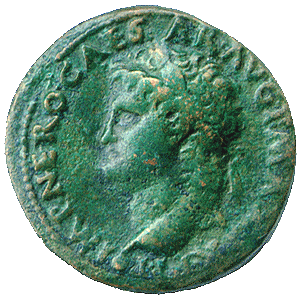 Contents --
Previous Article --
Next Article
Contents --
Previous Article --
Next Article
History has remembered the Roman emperor Nero as an evil man who sent many Christians to horrible deaths and sat idly by composing music while fire destroyed Rome. There is some evidence, though, that he was liked and respected by the army.
Nero started his reign with good intentions. He promised to govern "In the manner of Augustus," and ruled with compassion and responsibility. In fact, he said that he cursed the day he learned to write when he had to sign an order condemning a criminal to death. For the first ten years of his reign he ruled with the help of his two able tutors, Burrus and the Stoic philosopher Seneca. Unfortunately for the Roman people, his good intentions did not last. He soon became more interested in his own self-seeking life of pleasure than in governing the most powerful empire in the world. Nero loved to put on extravagant games in the arena and would throw tokens to the crowds that could be exchanged for valuable art and other fine presents. Some of these even included houses and ships.
He would rather compose music and poetry than personally take charge of affairs in the army and the provinces. Nero was extremely conceited and thought that the music and poetry he composed were of the finest artistic quality and he sorely resented anyone found napping or yawning during his performances. People were even hired to applaud his concerts! He arranged the murder of his mother, Agrippina the Younger, by sending her on a voyage in a decrepit old ship that fell apart after it left the harbor. When the tough old Agrippina attempted to swim for her life and was rescued by a boat, Nero sent two naval officers to murder her in her bed.
It was during Nero's reign that the bloody revolt of Boudicca, Queen of the Iceni took place in Britain. Britain had been invaded by Julius Caesar in 55 B.C. but had only recently been actually subdued by the Emperor Claudius in A.D. 43. London (Roman Londinium) had only been in existence for fourteen years at the time of Boudicca's revolt. Nero's able general and governor of Britain, Suetonius Paulinus, handled the dangerous job of keeping the province of Britain a part of the Roman Empire by defeating Boudicca's forces. Though large districts of Rome were regularly destroyed by fire, one of the most disastrous occurred in A.D. 68. Since Nero made no secret of the fact that he believed he was a talented singer, the rumor started that he set the fires to provide inspiration for a new ballad he was writing about the burning of Troy. To remove suspicion from himself, he blamed the Christians for setting the fire. They were not well liked anyway because they refused to sacrifice to the Roman gods or participate in holidays or patriotic festivals, most of which involved worship of Roman gods. Tacitus considered them haters of humankind and other Romans considered them unpatriotic. Most Romans were suspicious of them because of the secrecy of early Christian worship. Nero had many of them crucified or covered with pitch and burned alive. The more merciful deaths he ordered for Christians were at the claws of wild beasts in the arena.
Nero continued to live a life of luxury and sensual pleasure while he neglected the affairs of the government. He built a magnificent palace, called The Golden House, and declared that "Finally, I have a dwelling fit for a human being!" He married a faithful, upright woman of the family of Augustus named Octavia but later had her murdered. Then, he had a woman's husband murdered so that he could marry her. Finally, he stole Poppaea Sabina from Otho, a future Roman Emperor. Nero sent poor Otho to govern the province of Lusitania (Modern Portugal and Western Spain) when he found that Otho still loved Poppaea. Poppaea was as wild and immoral as Nero. He wound up kicking her to death during an argument at one of their drunken parties.
When rebellion broke out in Gaul and other urgent affairs needed to be tended to in the empire, Nero responded by taking an artistic tour of Greece, leaving the responsibilities of government to underlings. Finally fed up with Nero's misrule, first Vindex in Gaul and then Galba in Spain rose in rebellion. Nero panicked and attempted to flee, even when he might have led an army to put down the rebellions. He was still liked by many of the soldiers in the army because he had always treated them well. The Senate declared Nero a public enemy and condemned him to death by flogging with rods "In the ancient manner" at the urging of Nymphidius Sabinus, Nero's Praetorian Prefect. Upon hearing this, Nero fled and hid in the house of an ex-slave. He begged to have someone take a dagger and put an end to his life because he lacked the nerve to do so himself. Finally, when he heard the clatter of horses?hooves announcing the arrival of Roman cavalry troops coming to arrest him, he clumsily stabbed himself in the throat. As he slowly bled to death, he lamented "What an artist the world is losing!" What the Roman world really lost was an inept tyrant and what it gained was a year of bloody civil war as five men ravaged the countryside with their armies in their quest for the throne. Four of them would be dead before that year was up.
Go to next article on Clodius Macer
Go back to previous article on Britannicus